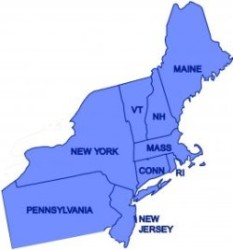Saturated Northeast Casino Market An Opportunity For iGaming Regulation

More states in the Northeast are looking to solve their budget deficits by raking in licensing fees and tax revenue from casinos. Currently there are plenty of brick and mortar gaming options in the region, with eight new venues expected to be added over the next three years. However, a new report from Moody suggests that there are already too many casinos competing for gambling dollars in the Northeast, with the report also examining how the over saturated market may affect the online gambling industry.
About the Moody Report
Entitled ‘Northeast Casinos Face Rising Tide of Competition‘, the news report from Moody examines the possible impact that the eight new casinos slated to open in the Northeast in the coming years will have on the gaming industry. The new casinos are expected to launch by 2018 at a combined cost of $5 billion, with the report warning that the casinos will only increase competition at a time when demand is already dwindling. Therefore, existing Northeast casinos will feel the impact of having an estimated 20,000 new slot machines added to the market, and as Moody’s Investors Service explains:
“Moody’s also notes that market conditions will be difficult for existing casinos such as Sugarhouse Casino and Harrah’s Philadelphia in Pennsylvania, Maryland Live casino in Maryland, Twin River casino in Rhode Island, and the Native American casinos in New York, which have already been struggling to adapt to flat revenue growth amid new entrants.”
Nevertheless, the new properties will also likely struggle to compete, as the casinos already in operation have been preparing for their opening by scaling back costs and paying off debt.
One piece of positive news anticipated by Moody’s is the increase in business likely to be experienced by slot machine and table games manufacturers. Most of the benefit, however, is likely to be enjoyed by only the biggest suppliers, including such companies as International Game Technology (IGT), Scientific Games, and Aristocrat Leisure.
How Online Gambling Can Help
There may still be some hope for Northeast casinos to remain viable in the over-crowded marketplace, though, by focusing on online gambling. Online gambling can benefit land-base casinos in the following ways:
– Providing a stream of revenue that doesn’t require any new gamblers to walk through the door. New Jersey casinos have enjoyed an increase in revenue from overall online gambling since it was legalized in the state two years ago.
– Cross-promoting casinos to online gamblers. Many casinos are finding ways to tie events at their land-based casinos with their online offerings. This can attract gamblers to the casino for special events and encourage visitors to check out their online sites and gamble from home when they’re unable to make it to the casino.
– Increasing customer retention. Online gambling can help to keep casinos fresh in customers’ minds, making them more likely to visit their brick and mortar locations when they do get the urge to gamble offline.
Current State of iGambling in the Northeast States
The Moody report points out that Atlantic City casinos will be among those hit hardest by the opening of eight additional casinos in the Northeast. Commenting on the predicted influx of competition expected over the next three years, an extract from the report states:
“The new supply will hit Atlantic City particularly hard. Increasing competition from casinos in Pennsylvania, Maryland, Delaware and New York has led to the closure of four casinos in 2014, and the new entrants in these states will likely cause the number of casinos in Atlantic City to continue to shrink.”
While online gambling may not be able to help individual casinos to grow in the new crowded Northeast marketplace, they could help to keep them sustainable and their doors open. Pennsylvania may be one of the states where online gambling will be of most benefit to casinos. Legislation is currently being considered to legalize iGaming and regulate the online gaming industry. The land-based casinos are almost unanimously in favor of legalization, as they recognize the potential benefits of expanding into online gaming. The one exception is the Sands Bethlehem, which is owned by Sheldon Adelson, one of the most outspoken opponents of online gaming.
New York is another state where competition among casinos is of concern. So far, there have been no serious discussions about legalizing and regulating online gambling there, but this could change. The final state mentioned in the report is Maryland, where there hasn’t been any consideration of online gaming.








